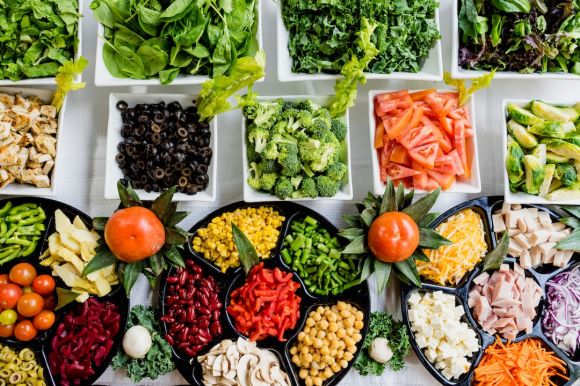When it comes to cooking, there are several techniques that can be used to prepare delicious and nutritious meals. Two popular methods are grilling and frying. Both techniques have their own unique benefits and drawbacks, and understanding these can help you make healthier choices in the kitchen. In this article, we will compare grilling and frying, exploring their impact on the nutritional value of the food and their overall health benefits.
Nutrition and meal planning
Eating a well-balanced and personalized meal plan is essential for maintaining a healthy lifestyle. It not only provides the necessary nutrients for your body but also helps you achieve your fitness goals. Creating a personalized meal plan may seem overwhelming at first, but with some guidance, it can be a simple and enjoyable process. In this article, we will discuss the steps to create a personalized meal plan that suits your unique needs and preferences.
Assess Your Goals and Needs
The first step in creating a personalized meal plan is to assess your goals and needs. Are you looking to lose weight, gain muscle, or simply maintain your current weight? Understanding your goals will help you determine the number of calories and macronutrients you need to consume. Additionally, consider any dietary restrictions or allergies you may have, as this will affect the types of foods you can include in your meal plan.Determine Your Calorie and Macronutrient Needs
Once you have assessed your goals and needs, the next step is to determine your calorie and macronutrient needs. Calorie needs vary depending on factors such as age, sex, weight, and activity level. There are online calculators available that can help you estimate your daily calorie needs. As for macronutrients, they refer to carbohydrates, proteins, and fats. The ratio of these macronutrients in your meal plan will depend on your goals. For example, if you are trying to lose weight, you may want to include a higher percentage of protein and fewer carbohydrates.Plan Your Meals
Now that you have determined your calorie and macronutrient needs, it's time to plan your meals. Start by making a list of your favorite healthy foods and ingredients. This will make it easier for you to come up with meal ideas. Aim to include a variety of fruits, vegetables, whole grains, lean proteins, and healthy fats. Be creative with your meals and experiment with different flavors and cooking techniques. Consider using spices and herbs to enhance the taste of your dishes without adding unnecessary calories.Prep Your Meals
Meal prepping is a great way to stay on track with your personalized meal plan. Dedicate some time each week to prepare your meals in advance. This can include chopping vegetables, cooking proteins, and portioning out your meals into containers. Having your meals ready to go will prevent you from making unhealthy food choices when you're short on time or feeling hungry.Stay Consistent and Monitor Your Progress
Creating a personalized meal plan is just the beginning. To see results, it's important to stay consistent and monitor your progress. Keep track of what you eat each day and how you feel after each meal. If you notice that you're not making progress towards your goals, consider revisiting your meal plan and making adjustments as needed. Remember that everyone's body is different, so it may take some trial and error to find the perfect meal plan for you. In conclusion, creating a personalized meal plan is a valuable tool for achieving your health and fitness goals. By assessing your goals and needs, determining your calorie and macronutrient needs, planning your meals, prepping your meals, and staying consistent, you can create a meal plan that is tailored to your individual needs and preferences. Remember to listen to your body and make adjustments as needed. With time and effort, you will be well on your way to a healthier and happier you.
Snacking can be a tempting habit, especially when hunger strikes between meals. But reaching for unhealthy snacks can sabotage your efforts to maintain a balanced diet. The good news is that there are plenty of healthy snacking alternatives available that not only satisfy your cravings but also provide nourishment. In this article, we will explore some ideas and alternatives for healthy snacking to help you make better choices.
1. Fresh Fruits and Vegetables
When it comes to healthy snacking, fresh fruits and vegetables are always a great option. They are packed with essential vitamins, minerals, and fiber. Try keeping a bowl of assorted fruits on your kitchen counter or a container of pre-cut vegetables in your fridge for easy access. Whether it's a juicy apple, a handful of berries, or some crunchy carrot sticks, these natural snacks will not only satisfy your hunger but also provide a refreshing burst of flavor.2. Nuts and Seeds
Nuts and seeds are excellent sources of healthy fats, protein, and fiber. They are also rich in vitamins and minerals, making them a nutritious choice for snacking. Almonds, walnuts, pumpkin seeds, and sunflower seeds are some examples of healthy options. However, it's important to keep portion sizes in mind as they can be high in calories. A small handful is usually sufficient to keep you satisfied between meals.3. Greek Yogurt
Greek yogurt is a versatile and protein-rich snack that can be enjoyed in various ways. You can eat it plain or add some fresh fruits, nuts, or a drizzle of honey for added flavor. Greek yogurt not only provides a good source of protein but also contains probiotics that promote a healthy gut. It's a great option for those looking to satisfy their sweet tooth while still making a healthy choice.4. Rice Cakes and Whole Grain Crackers
If you're craving something crunchy, rice cakes and whole grain crackers can be a healthier alternative to traditional potato chips or cookies. Look for options that are made with whole grains and minimal added sugars. You can top them with avocado, hummus, or a slice of lean protein like turkey or chicken for a satisfying and nutritious snack.5. Homemade Smoothies
Smoothies are a fantastic way to pack in nutrients while enjoying a delicious snack. With endless combinations of fruits, vegetables, and protein sources like yogurt or protein powder, you can create a personalized blend that suits your taste and dietary needs. Just be mindful of the added sugars that can come from sweetened yogurt or fruit juices. Opt for unsweetened options and use natural sweeteners like honey or dates instead.6. Dark Chocolate
Yes, you read that right! Dark chocolate can be a guilt-free indulgence when enjoyed in moderation. It contains antioxidants and may have various health benefits, including improved heart health. Look for dark chocolate that has a high percentage of cocoa (70% or higher) and enjoy a small piece or two as a treat. In conclusion, healthy snacking doesn't have to be boring or tasteless. By incorporating fresh fruits and vegetables, nuts and seeds, Greek yogurt, rice cakes and whole grain crackers, homemade smoothies, and even dark chocolate into your snacking routine, you can satisfy your cravings while nourishing your body. Remember to listen to your body's hunger cues and choose snacks that provide a balance of nutrients. Happy snacking!
Have you ever experienced a mid-afternoon slump? That feeling when your energy levels drop, and you can barely keep your eyes open? We've all been there. But have you ever stopped to consider that your nutrition might be to blame? The food we eat plays a crucial role in determining our energy levels throughout the day. In this article, we will explore the connection between nutrition and energy levels, and how making the right dietary choices can help boost your energy and overall well-being.
Understanding Macronutrients
To understand the relationship between nutrition and energy levels, it's important to first understand macronutrients. Macronutrients are the three main components of our diet: carbohydrates, proteins, and fats. Each of these macronutrients plays a unique role in providing energy to our bodies. Carbohydrates are the body's primary source of energy. When we consume carbohydrates, they are broken down into glucose, which is then used by our cells for energy. Whole grains, fruits, and vegetables are excellent sources of complex carbohydrates, which release energy slowly and provide a steady source of fuel throughout the day. Proteins, on the other hand, are essential for repairing and building tissues. They also play a role in providing energy when carbohydrates are in short supply. Foods such as lean meats, poultry, fish, eggs, and legumes are rich sources of protein. Fats, although often demonized, are an important part of a balanced diet. They provide a concentrated source of energy and are necessary for the absorption of certain vitamins. Choosing healthy fats, such as those found in avocados, nuts, and olive oil, can help maintain stable energy levels.The Role of Micronutrients
While macronutrients are crucial for energy production, micronutrients also play a vital role. Micronutrients are the vitamins and minerals that our bodies need in small amounts to function properly. B vitamins, for example, are essential for converting food into energy. Iron is necessary for the production of red blood cells, which carry oxygen to our cells and tissues. Magnesium is involved in over 300 biochemical reactions in the body, including energy production. A well-balanced diet that includes a variety of fruits, vegetables, whole grains, lean proteins, and healthy fats ensures an adequate intake of these micronutrients, which can help optimize energy levels.The Impact of Hydration
In addition to proper nutrition, hydration also plays a significant role in our energy levels. Even mild dehydration can lead to fatigue and decreased cognitive function. Water is essential for transporting nutrients to our cells and removing waste products. Aim to drink at least 8 glasses of water per day, and more if you are physically active or in a hot climate.The Importance of Meal Timing
When and how often we eat can also impact our energy levels. Eating regular meals and snacks throughout the day helps maintain stable blood sugar levels, preventing energy crashes. It's also important to include a balance of macronutrients in each meal and snack to provide a steady release of energy.Conclusion: Fueling Your Body for Optimal Energy
In conclusion, the food we eat has a direct impact on our energy levels. Choosing a well-balanced diet rich in complex carbohydrates, lean proteins, healthy fats, and micronutrients can help fuel our bodies and maintain stable energy throughout the day. Remember to stay hydrated and eat regular meals and snacks to prevent energy crashes. By making the right dietary choices, you can optimize your energy levels and improve your overall well-being.
Intermittent fasting has become a popular trend in the world of health and wellness. But what exactly is it and does it really work? In this article, we will explore the concept of intermittent fasting and its potential benefits.
Understanding Intermittent Fasting
Intermittent fasting is not a diet in the traditional sense, but rather an eating pattern. It involves alternating periods of fasting and eating. There are several different approaches to intermittent fasting, but the most common ones are the 16/8 method, where you fast for 16 hours and eat within an 8-hour window, and the 5:2 method, where you eat normally for 5 days and restrict your calorie intake to 500-600 calories for 2 non-consecutive days.The Science Behind Intermittent Fasting
Intermittent fasting works by triggering various metabolic changes in the body. During the fasting period, your body shifts from using glucose as its primary fuel source to burning stored fat for energy. This can lead to weight loss and improved metabolic health. Additionally, intermittent fasting has been shown to increase levels of human growth hormone (HGH), which can aid in muscle growth and repair.Benefits of Intermittent Fasting
Weight Loss: One of the main reasons people turn to intermittent fasting is for weight loss. By restricting the time window in which you eat, you naturally consume fewer calories, leading to a calorie deficit and, ultimately, weight loss. Improved Insulin Sensitivity: Intermittent fasting has been shown to improve insulin sensitivity, which is important for maintaining stable blood sugar levels. This can be particularly beneficial for individuals with type 2 diabetes or those at risk of developing it. Reduced Inflammation: Chronic inflammation is believed to contribute to various health issues, including heart disease, cancer, and Alzheimer's disease. Intermittent fasting has been shown to reduce inflammation markers in the body, potentially lowering the risk of these diseases. Enhanced Brain Function: Some studies suggest that intermittent fasting may have cognitive benefits. It has been shown to increase the production of a protein called brain-derived neurotrophic factor (BDNF), which is involved in the growth and protection of brain cells.Is Intermittent Fasting Right for You?
While intermittent fasting can offer numerous health benefits, it may not be suitable for everyone. Individuals with a history of eating disorders, pregnant or breastfeeding women, and those with certain medical conditions should consult with a healthcare professional before trying intermittent fasting. It's also important to note that the effectiveness of intermittent fasting may vary from person to person. Some individuals may find it easier to adhere to than others, and results can depend on factors such as overall diet and lifestyle.Tips for Successful Intermittent Fasting
If you're considering trying intermittent fasting, here are a few tips to help you get started: Start Slow: If you're new to fasting, it's best to start with shorter fasting periods and gradually increase the duration as your body adapts. Stay Hydrated: Drink plenty of water during the fasting period to stay hydrated and help curb hunger. Eat Nutrient-Dense Foods: When it's time to eat, focus on consuming whole, nutrient-dense foods to ensure you're getting the necessary vitamins and minerals. Listen to Your Body: Pay attention to how your body responds to intermittent fasting. If you experience any negative side effects or discomfort, it may not be the right approach for you. In conclusion, intermittent fasting is an eating pattern that involves alternating periods of fasting and eating. It has gained popularity for its potential benefits in weight loss, improved insulin sensitivity, reduced inflammation, and enhanced brain function. However, it may not be suitable for everyone, and individual results can vary. If you're considering trying intermittent fasting, it's important to do so under the guidance of a healthcare professional and listen to your body's needs.
In today's health-conscious world, supplements have become a popular topic of discussion. Everywhere you look, there's a new supplement claiming to offer a wide range of benefits, from boosting energy to improving cognitive function. But do we really need these supplements, or are they just a marketing ploy? Let's take a closer look.
Understanding Supplements
Before we delve into whether or not supplements are necessary, it's important to understand what they actually are. Supplements are products that contain one or more dietary ingredients, such as vitamins, minerals, herbs, or amino acids. They are intended to supplement the diet and provide nutrients that may be missing or insufficient in one's daily intake.The Problem with Our Diets
One of the main reasons why supplements have gained popularity is because our diets have become increasingly deficient in important nutrients. With the rise of processed foods and the decline of fresh, whole foods, many people are not getting the essential vitamins and minerals their bodies need to function optimally. This is where supplements can come in handy, filling the gaps in our nutrition.Targeted Supplementation
While it's true that some people may benefit from taking supplements, it's important to note that not everyone needs them. Before considering supplementation, it's crucial to assess your individual needs and consult with a healthcare professional. They can help determine if you have any nutrient deficiencies or specific health conditions that may warrant supplementation.Vitamins and Minerals
When it comes to vitamins and minerals, it's generally best to obtain them from whole foods whenever possible. However, there are certain situations where supplementation may be necessary. For example, individuals with malabsorption issues or those following restrictive diets may need to supplement certain nutrients to meet their requirements. Additionally, certain populations, such as pregnant women or the elderly, may benefit from specific supplements to support their unique needs.Herbs and Botanicals
The use of herbs and botanicals as supplements has been a part of traditional medicine practices for centuries. While there is some evidence to support the use of certain herbs for specific conditions, it's important to approach herbal supplements with caution. Many herbs can interact with medications or have side effects, so it's crucial to consult with a healthcare professional before incorporating them into your routine.Supplement Quality and Safety
When choosing supplements, it's important to prioritize quality and safety. Look for products that have been third-party tested for purity and potency. Additionally, be wary of extravagant claims or products that promise quick fixes. Supplements are not meant to replace a healthy lifestyle or medical treatment; they should be used as a complement to a well-rounded approach to health.Conclusion
In conclusion, the need for supplements varies from person to person. While some individuals may benefit from targeted supplementation to address specific nutrient deficiencies or health conditions, others may be able to obtain all the necessary nutrients from a balanced diet. It's essential to approach supplements with caution, seeking guidance from healthcare professionals and prioritizing quality and safety. Ultimately, a well-rounded approach to health, including a nutritious diet and regular exercise, is the foundation for optimal well-being.
Meal planning is a crucial aspect of any successful weight loss journey. It involves carefully selecting and preparing meals in advance, ensuring that you have nutritious and balanced options readily available throughout the week. While it may require some initial effort and time investment, the benefits of meal planning for weight loss are numerous and significant. In this article, we will explore why meal planning is important for weight loss and how it can help you achieve your health goals.
Maintains portion control
One of the key advantages of meal planning is that it allows you to control your portion sizes. When you plan your meals in advance, you can accurately measure and portion out your food, ensuring that you are consuming the appropriate amount of calories for weight loss. This prevents overeating and helps you develop a better understanding of proper portion sizes, which is crucial for maintaining a healthy weight in the long run.Promotes healthy food choices
Meal planning also encourages you to make healthier food choices. When you take the time to plan your meals, you have the opportunity to incorporate a variety of nutritious foods into your diet, such as lean proteins, whole grains, fruits, and vegetables. By having a well-balanced meal plan, you are less likely to rely on unhealthy and processed options, which are often high in calories, sugar, and unhealthy fats. Instead, you can focus on consuming nutrient-dense foods that support your weight loss goals.Saves time and money
Contrary to popular belief, meal planning can actually save you time and money in the long run. By planning your meals in advance, you can streamline your grocery shopping process and avoid unnecessary trips to the store. Additionally, preparing meals in bulk and portioning them out for the week can save you time during busy weekdays when you may not have the energy or time to cook. This can also prevent impulsive and unhealthy food choices when you are short on time, as you already have healthy meals prepared and ready to go.Prevents mindless eating
Another benefit of meal planning is that it helps prevent mindless eating, which can be a significant contributor to weight gain. When you have a meal plan in place, you are less likely to snack on unhealthy foods or grab whatever is convenient in the moment. Instead, you have pre-determined meals and snacks that align with your weight loss goals. This eliminates the need to make spontaneous and potentially detrimental food choices, leading to better overall eating habits.Encourages consistency
Consistency is key when it comes to weight loss, and meal planning can help you stay on track. By having a structured plan in place, you are less likely to deviate from your goals and succumb to unhealthy temptations. Meal planning provides you with a sense of control and accountability, making it easier to stick to your desired calorie intake and make healthier choices. This consistency is essential for long-term success in achieving and maintaining a healthy weight. In conclusion, meal planning is a vital component of any weight loss journey. It helps maintain portion control, promotes healthy food choices, saves time and money, prevents mindless eating, and encourages consistency. By incorporating meal planning into your routine, you can effectively manage your calorie intake and develop healthier eating habits that support your weight loss goals. So, start planning your meals today and enjoy the benefits of a well-organized and nourishing eating plan.Introduction
In today's health-conscious society, there is no shortage of popular diets promising quick weight loss and improved well-being. From low-carb to intermittent fasting, the options are endless. While these diets may offer some benefits, they also come with their fair share of drawbacks. In this article, we will explore the pros and cons of popular diets, helping you make an informed decision about which approach is right for you.The Low-Carb Diet
Pros: The low-carb diet, such as the ketogenic diet, can be effective for weight loss. By reducing your carbohydrate intake and increasing your consumption of healthy fats, you can promote fat burning and feel satiated for longer periods. This diet may also improve blood sugar control and reduce the risk of certain chronic diseases, such as type 2 diabetes. Cons: However, the low-carb diet can be challenging to sustain long-term. It often requires strict adherence and may lead to nutrient deficiencies if not carefully planned. Additionally, some individuals may experience unpleasant side effects, such as the "keto flu" during the initial adaptation phase.The Mediterranean Diet
Pros: The Mediterranean diet emphasizes whole foods, including fruits, vegetables, whole grains, legumes, and lean proteins, while limiting processed foods and saturated fats. It has been associated with numerous health benefits, including reduced risk of heart disease, stroke, and certain cancers. This diet is also known for its flexibility and sustainability, making it a popular choice for many. Cons: While the Mediterranean diet offers many advantages, it may not be suitable for everyone. Its emphasis on whole grains and legumes can be problematic for individuals with certain medical conditions, such as celiac disease or irritable bowel syndrome. Additionally, some people may find the Mediterranean diet too high in calories for weight loss purposes.Intermittent Fasting
Pros: Intermittent fasting involves cycling between periods of eating and fasting. This approach has been shown to promote weight loss, improve insulin sensitivity, and even enhance brain function. It can also simplify meal planning and reduce the need for constant snacking, making it convenient for some individuals. Cons: Despite its potential benefits, intermittent fasting may not be suitable for everyone. It can be challenging to adhere to, especially in social situations or for individuals with a history of disordered eating. Some people may also experience side effects such as fatigue, irritability, or difficulty concentrating during fasting periods.The Paleo Diet
Pros: The paleo diet aims to mimic the eating habits of our ancient ancestors, focusing on whole, unprocessed foods. By eliminating grains, legumes, and dairy, it encourages the consumption of lean proteins, fruits, vegetables, and healthy fats. Many people find that this diet helps reduce inflammation and promotes weight loss. Cons: While the paleo diet has its merits, it may not be suitable for everyone. By excluding entire food groups, such as grains and dairy, it can be challenging to meet all of your nutritional needs. Additionally, the paleo diet may be more expensive and time-consuming to follow, as it often requires sourcing organic and grass-fed products.Conclusion
When it comes to choosing a diet, it's essential to consider both the pros and cons. While low-carb diets may offer quick weight loss, they can be difficult to sustain. The Mediterranean diet may be flexible and heart-healthy, but it may not be suitable for everyone. Intermittent fasting can simplify meal planning, but it may not be suitable for individuals with a history of disordered eating. Lastly, the paleo diet may reduce inflammation, but it can be challenging to meet nutritional needs and more expensive to follow. Ultimately, the best diet is one that is personalized to your individual needs and preferences. Consulting with a healthcare professional or registered dietitian can help you find the right approach that promotes both your physical and mental well-being. Remember, there is no one-size-fits-all solution, and it's important to listen to your body and make choices that support your long-term health goals.
When it comes to taking care of our mental health, we often think about therapy, medication, and self-care practices. However, one area that is often overlooked but plays a significant role in our mental well-being is nutrition. The food we consume has a direct impact on our brain function and can greatly influence our mood, cognition, and overall mental health. In this article, we will explore the connection between nutrition and mental health and discuss the importance of a balanced diet for optimal psychological well-being.
The Gut-Brain Axis: A Two-Way Relationship
Recent research has shed light on the intricate relationship between our gut and brain, known as the gut-brain axis. This bidirectional communication system allows the gut and brain to send signals to each other, influencing not only our physical health but also our mental state. The gut is home to trillions of bacteria, collectively known as the gut microbiota, which play a crucial role in digestion and nutrient absorption. These bacteria also produce neurotransmitters, such as serotonin, dopamine, and gamma-aminobutyric acid (GABA), which are essential for regulating mood and emotions.Nutrients for Mental Health
Certain nutrients have been found to have a particularly positive impact on mental health. Omega-3 fatty acids, commonly found in fatty fish like salmon and sardines, have been shown to reduce symptoms of depression and anxiety. These essential fats help maintain the integrity of brain cell membranes and promote the growth of new brain cells. Additionally, foods rich in antioxidants, such as berries, dark chocolate, and green leafy vegetables, can protect the brain from oxidative stress, which is linked to mental health disorders.The Role of Macronutrients
Macronutrients, including carbohydrates, proteins, and fats, are the building blocks of our diet. Each macronutrient plays a vital role in brain function and mental health. Carbohydrates are the brain's primary source of energy and are crucial for optimal cognitive function. Whole grains, fruits, and vegetables are excellent sources of complex carbohydrates that provide a steady release of energy throughout the day. Proteins, found in meat, fish, legumes, and dairy products, are essential for the production of neurotransmitters, which regulate mood and emotions. Healthy fats, such as those found in avocado, nuts, and olive oil, are necessary for the proper functioning of the brain and help reduce inflammation, which is often associated with mental health disorders.The Impact of Micronutrients
Micronutrients, including vitamins and minerals, are essential for maintaining good mental health. Vitamin D, often referred to as the "sunshine vitamin," is crucial for regulating mood and has been linked to symptoms of depression. Sources of vitamin D include sunlight, fatty fish, and fortified dairy products. B vitamins, particularly folate and vitamin B12, are important for the synthesis of neurotransmitters and can help alleviate symptoms of depression. Leafy greens, legumes, and fortified cereals are excellent sources of these vitamins. Minerals such as zinc, magnesium, and iron also play a role in mental health and can be found in foods like nuts, seeds, whole grains, and lean meats.The Importance of a Balanced Diet
While individual nutrients play a role in mental health, it is essential to remember that a balanced diet is the key to overall well-being. A diet rich in fruits, vegetables, whole grains, lean proteins, and healthy fats provides the necessary nutrients for optimal brain function. On the other hand, a diet high in processed foods, sugar, and unhealthy fats can negatively impact mental health and increase the risk of developing mental health disorders. In conclusion, the connection between nutrition and mental health is undeniable. The food we consume has a profound impact on our brain function and overall well-being. By prioritizing a balanced diet rich in nutrients, we can support our mental health and enhance our overall quality of life. So, let's remember to nourish our minds as well as our bodies, because good nutrition is essential for a healthy mind.
Fats have long been demonized in the world of nutrition. They have been blamed for weight gain, heart disease, and a variety of other health problems. However, recent research has shed light on the important role that fats play in a healthy diet. In fact, fats are an essential nutrient that our bodies need to function properly. In this article, we will explore the role of fats in a healthy diet and discuss the different types of fats and their benefits.









